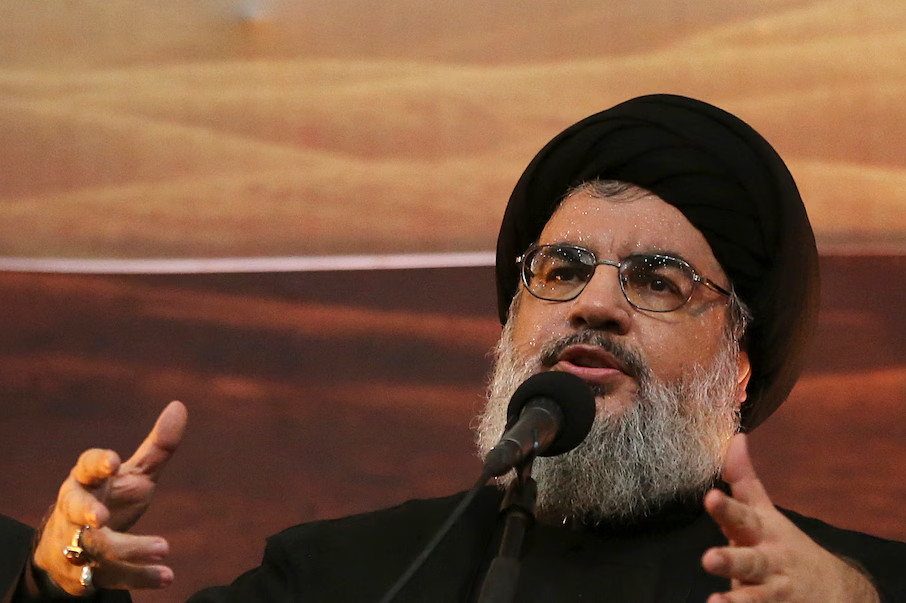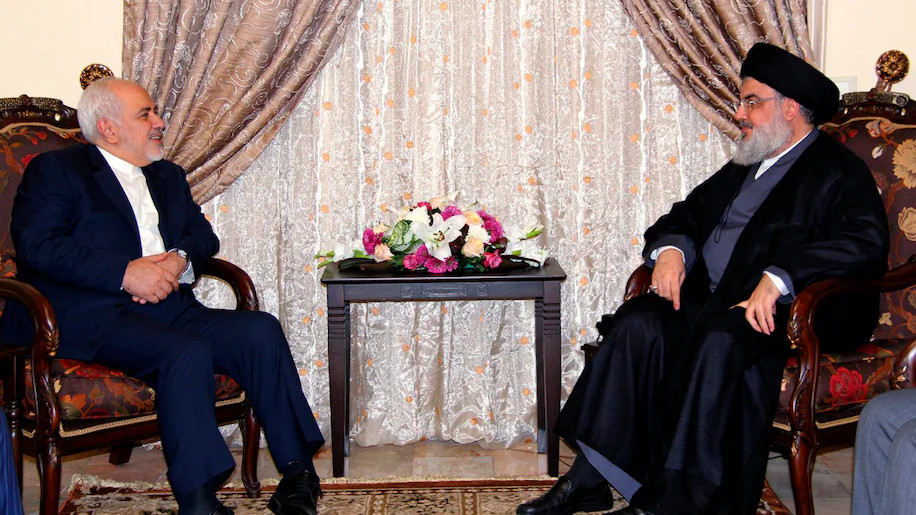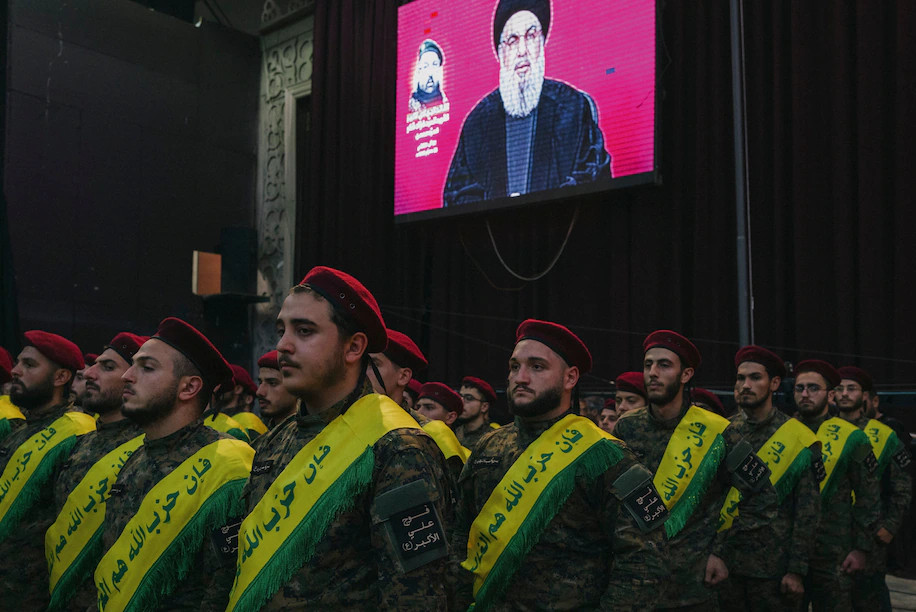
Date: 2026-01-17 Page is: DBtxt003.php txt00027474
MIDDLE EAST
LEBANON / HEZBOLLAH
Hasan Nasrallah, Hezbollah leader and force in Middle East, is killed
LEBANON / HEZBOLLAH
Hasan Nasrallah, Hezbollah leader and force in Middle East, is killed

Hezbollah leader Hasan Nasrallah addresses supporters in 2014. (Hussein Malla/AP)
Original article: https://www.washingtonpost.com/obituaries/2024/09/28/hasan-nasrallah-hezbollah-lebanon-dies
Peter Burgess COMMENTARY
The turmoil in the Middle East is tragic.
There are a myriad of opinions about the root cause of the turmoil, and my opinion is just one in many millions!
There is not one clear and simple answer ... but rather a complex array of partial answers, none of which is particularly well accepted.
In my view there are several 'extreme' groups that may not be very large, but make a lot of noise and are totally committed to their point of view and goals.
At the present time, the Government of Israel is dominated by such a group, which also serves to protect Prime Minister Netenyahu who apparently needs their 'protection' because of a litany of questionable actions over many years!
Many people around the world are supportive of Israel for historic reasons ... specifically the horrors of the holocaust perpetrated by the Nazis less than a century ago. But most of the generation that experienced those horrors directly has now passed, and the younger generations are not going to be as tolerant of Israel into the future as they have been in the past.
The Arab Middle East has failed up to now to have a coordinated atrategy for anything ... and this has resulted in rather poor socio-enviro-economic performance overall. Pockets of massive oil wealth have enabled some amazing 'projects' that have show-cased glitz and glamour but rather less of meaningful substance. This is changing, but quite slowly.
I worked in the Middle East in the early 1980s as the region started to deploy the vast new wealth that was flowing into the region after the OPEC oil shock of the 1970s. In the Middle East, words like 'indulgence' and 'excessive' come to mind ... while other more positive ideas do not.The Middle East has financial wealth ... but the underlying tensions in the region make it difficult to project a great outcome from the deployment of this wealth, but more likely the exact opposite.
Sadly, this opposite ... a downward spiral of violence seems to be emerging as the most likely future scenario ... dragging everyone down in a catastrophic way! This 'future' has never been closer in my quite long life!
Peter Burgess
The Shiite cleric, 64, grew Hezbollah from a Lebanese guerrilla movement into the region’s most capable paramilitary organization, and a leading foe of Israel.
Written by Liz Sly
September 28, 2024 at 7:52 a.m. EDT
Hasan Nasrallah, a Shiite cleric who oversaw the Lebanese militant group Hezbollah for decades and became one of the most powerful and divisive leaders in the Middle East, revered by his followers as a savior and condemned by his foes as a terrorist, died Sept. 27 in Beirut. He was 64.
The Israel Defense Forces said in a statement that Mr. Nasrallah “was eliminated” alongside other Hezbollah commanders as it struck what it called the group’s “central headquarters” in the southern suburbs of Beirut. Hezbollah confirmed the death but didn’t detail the cause. The massive airstrike leveled several residential buildings and sent plumes of smoke over neighborhoods in the city’s south.
Mr. Nasrallah, who transformed his Iranian-backed Shiite Islamist guerrilla movement into the single most capable paramilitary organization in the Middle East, dedicated his life to confronting Israel and the United States. “He is the shrewdest leader in the Arab world, and the most dangerous,” Daniel Ayalon, then serving as Israel’s ambassador to the United States, told The Washington Post in 2006.
During his stewardship since the early 1990s, Mr. Nasrallah had overseen Hezbollah’s expansion from a shadowy movement dedicated to expelling occupying Israeli forces in Lebanon into a regional military force that undertook operations beyond Lebanon’s borders, in Syria, Iraq and Yemen.
Times of conflict and crisis served to elevate Mr. Nasrallah’s influence. In the past year, he had become a powerful wild card as Israel waged all-out war in Gaza after a deadly raid and hostage-taking by the Palestinian militia group Hamas last October. Hezbollah launched sporadic barrages into Israel from bases in southern Lebanon, keeping the region on the edge of a possible wider conflagration.
In July, an Israeli airstrike just three miles from central Beirut killed Mr. Nasrallah’s top commander, Fuad Shukr, in apparent retaliation for a rocket attack that killed 12 children on a soccer field in the Israeli-occupied Golan Heights. Hezbollah responded by firing more than 340 Katyusha rockets and a wave of attack drones in a coordinated assault targeting Israeli military sites.
In a speech, Mr. Nasrallah said the Hezbollah blitz displayed the militant group’s ability to strike deep within Israel any time it chose.
Although he never held any official position in government, Mr. Nasrallah was the most influential politician in Lebanon. Under Mr. Nasrallah, Hezbollah became the country’s dominant political party, with seats in the Lebanese parliament, ministers in the cabinet, and the capacity to make or break the country’s eternally fragile governments.
At the same time, he ran what amounted to a parallel government that operated alongside the weaker Lebanese state. Hezbollah’s network of clinics, schools and social services for its Shiite constituency surpasses what the Lebanese government can offer. Its militia outclasses the Lebanese army and ranks as the “world’s most heavily armed non-state actor,” according to a 2018 report by the Center for Strategic and International Studies.
Mr. Nasrallah remained Shiite Iran’s staunchest and most trusted Arab ally, enabling Tehran to project its influence beyond Iran to the shores of the Mediterranean and to Israel’s border with Lebanon.
In 2012, the U.S. Treasury Department named Mr. Nasrallah and others in Hezbollah’s leadership to its “specially designated global terrorist” list, citing an “active role” in propping up the despotic regime of Syrian President Bashar al-Assad, as well as Mr. Nasrallah’s participation in “terrorist activities in the Middle East and around the world.”
The U.S. government has linked Hezbollah to suicide bombings in 1983 against the U.S. Embassy and Marine barracks in Beirut and to the kidnapping of American citizens. Washington said Shukr played a “central role” in the barracks attack.
Among his followers, Mr. Nasrallah was seen as a father figure, a moral compass and a political guide. He was lauded as the man who empowered Lebanon’s once downtrodden and impoverished Shiite community and protected it from Israeli incursions by turning Hezbollah into a formidable deterrent force.
Because of threats to his life from Hezbollah’s many enemies, he had not been seen in public since 2014. Instead, he communicated with his followers through regularly televised addresses broadcast from an undisclosed location.
Wearing the black turban that signifies descent from the prophet Muhammad, he delivered advice on topics ranging from complicated regional events to personal hygiene during the covid pandemic, sometimes speaking for hours without notes, always in the folksy yet articulate manner that established him as a skilled orator.
His death will leave a gaping hole in the Hezbollah movement, within Lebanon and for Iran’s regional ambitions, said Hanin Ghaddar of the Washington Institute for Near East Policy. “Nasrallah is Hezbollah, and Hezbollah is Nasrallah,” she said.

Mr. Nasrallah, right, meets with Iran's then-Foreign Minister Mohammad Javad Zarif in Beirut on Feb. 11, 2019. (Uncredited/AP)
Path to leadership
Hasan Nasrallah, whose father had a vegetable stall and then a modest grocery store, was born in a predominantly Christian shantytown near Beirut on Aug. 31, 1960. He was the ninth of 10 siblings and was drawn from an early age to the study of theology.
In 1978, he went to study in Iraq’s Shiite holy city of Najaf. It was a time of intense religious fervor for the region’s Shiites, who were rallying around the teachings of Mohammed Bakr al-Sadr. Sadr’s religious theories were inspired in part by Ayatollah Ruhollah Khomeini, the revolutionary Iranian leader who had also studied and lectured in Najaf.
Mr. Nasrallah joined Sadr’s Dawa party and studied under Abbas al-Musawi, a Lebanese sheikh who became one of the founding leaders of Hezbollah after its creation by Iran in 1982.
After Musawi’s assassination by Israel in 1992, Mr. Nasrallah succeeded him as Hezbollah’s secretary general, a role he held until his death. Under the terms of the agreement that ended Lebanon’s 15-year civil war in 1990, Hezbollah was the only faction allowed to keep its weapons, for the purpose of sustaining the war of “resistance” against the Israeli troops occupying southern Lebanon.
For the next eight years, Mr. Nasrallah led the steady drumbeat of suicide attacks and bombings that eventually forced the withdrawal of Israeli troops from Lebanon in 2000. The death of his 18-year-old son, Hadi, in a battle with Israel in 1997 burnished Mr. Nasrallah’s leadership credentials, establishing him as a man who had shared in the suffering of those battling the Israeli occupation.
He and his wife, Fatima Yassin, are believed to have had four other children. A list of survivors was not immediately available.
The departure of the Israelis, which brought peace to the entire country for the first time in nearly 25 years, was hailed in Lebanon and across the region as a victory for Hezbollah and a personal triumph for Mr. Nasrallah.
But Mr. Nasrallah’s achievements on behalf of the Shiite population began to rankle among Lebanon’s other religious communities, a divide that deepened over a suicide bombing in February 2005 that killed Lebanon’s leading Sunni politician, the former prime minister Rafiq al-Hariri, along with 21 others.
Syria was blamed by many Lebanese for organizing the assassination, and Syrian forces, which had occupied Lebanon since 1976, were forced to withdraw, under pressure from mass street protests held by Sunnis, Christians and Druze.

Mr. Nasrallah gives a televised speech during the funeral of the
militant group's top commander, Fuad Shukr, in south Beirut on Aug. 1.
(Lorenzo Tugnoli for The Washington Post)
In 2020, a U.N.-backed tribunal in the Netherlands convicted a member of Hezbollah (and acquitted three others) of conspiracy for participating in the assassination, but said it had failed to find evidence tying Hezbollah’s leadership or Syria to the attack.
Hezbollah has also been suspected over the decades in a subsequent string of assassinations of journalists, politicians and activists. In the wake of the Hariri killing, the international community, and especially the United States, began to pressure Hezbollah to disarm.
Mr. Nasrallah briefly restored his nationalist credentials during Hezbollah’s 2006 war with Israel, in which the group fought the mightier Israeli army to a standstill. As the only Arab leader who had succeeded in holding back Israel in its almost 60 years of existence, he was feted across the Arab world as a hero.
Hezbollah emerged from the war with renewed strength and determination to build up its arsenal and develop bigger and more sophisticated weapons with the capacity to hit targets deep within Israeli territory. In Lebanon, resentment of Hezbollah’s growing muscle began to build.
Prioritizing his sect
In 2008, after the Lebanese government attempted to curtail Hezbollah’s expanding private telecommunications network, Mr. Nasrallah sent his fighters onto the streets. In characteristic form, he ordered his troops into action in a televised speech, in which he described the network as a “red line … tantamount to a declaration of war.”
“Our response,” he added, “is that whoever declares a war against us — whether it is a brother or father — it is our right to defend ourselves and our existence.”
Hezbollah fighters overran West Beirut, historically a Sunni sphere of influence. The show of force affirmed Hezbollah as the country’s single most powerful military force. But it also undermined Mr. Nasrallah’s stature as a nationalist leader — for the first time, Hezbollah had turned the weapons it kept for the purpose of fighting Israel against fellow Lebanese.
Mr. Nasrallah’s dispatch in 2012 of Hezbollah fighters to Syria to support Assad’s efforts to crush the rebellion against his rule further polarized Lebanon and the region. The intervention accentuated the sectarian undertones of a war that pitted a mostly Sunni rebellion against the Iranian-allied Syrian regime, dominated by members of Assad’s Alawite sect, an offshoot of Shiite Islam.
Militarily, the intervention was a success. Hezbollah’s disciplined and well-trained fighters bolstered the flagging capabilities of Syria’s depleted army, ensuring the survival of Assad at a key moment and helping Iran reinforce its foothold in Syria.
But the effort also dented Mr. Nasrallah’s Pan-Arab credentials, marking him as a leader who prioritized the interests of his sect. After enduring decades of Syrian occupation, many Lebanese, especially the Syrian rebels’ coreligionists in the Sunni community, sympathized with the rebellion against Assad.
And the conflict cost money and lives on the eve of what would become Mr. Nasrallah’s greatest challenge — the collapse of the Lebanese economy and the harsh new sanctions imposed by the Trump administration on his main financier, Iran.
The unraveling in 2019 of the country’s banking and financial system brought widespread deprivation to all Lebanese, including the Shiites who had seen their living conditions improve under Mr. Nasrallah’s leadership.
Hezbollah had to contend with reduced levels of financing from Iran, whose own economy was rapidly deteriorating. The movement was forced to embark on cutbacks to its generous spending programs, and for the first time, glimmers of discontent with Hezbollah began to surface among Shiites.
The frequency of Mr. Nasrallah’s speeches increased as he sought to ease the concerns of his constituency, addressing issues such as the interest rates banks should set and the luring of Chinese investments to Lebanon to resolve the economic crisis.
The speeches revealed him as a leader better suited to fighting wars than addressing the country’s financial problems, said a Lebanese journalist who supports Hezbollah but acknowledges that the group has shortcomings. He spoke on the condition of anonymity because of the risk of retribution against those who criticize Hezbollah.
But such was the adulation with which Mr. Nasrallah was regarded by his followers that he was never personally blamed by Hezbollah’s constituency for the calamities taking place in Lebanon, said Ghaddar, the analyst with the Washington Institute. In a measure of his paramountcy, no rivals emerged during his tenure.
“He represents the golden age of Hezbollah, its victories and successes,” Ghaddar said. “The golden age of Hezbollah dies with Nasrallah.”
Written by Liz Sly ... Liz Sly is a correspondent-at-large covering global affairs. She has spent more than 17 years covering the Middle East, including the first and second Iraq wars. Other postings include Washington, Africa, China, Afghanistan and Italy.follow on X @LizSly
Brian Murphy contributed to this report.